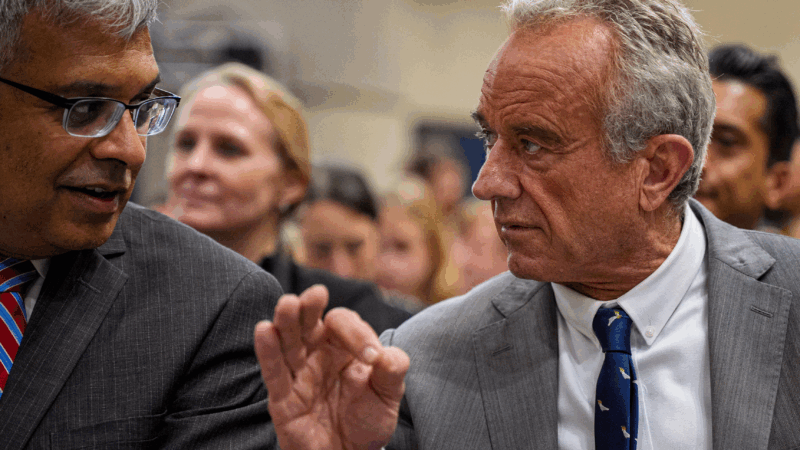RFK Jr. says autism database will use Medicare and Medicaid info
The National Institutes of Health will use information from federal health insurance programs Medicare and Medicaid to create a “real-world data platform” to determine the cause of autism, the agency announced this week.
The Department of Health and Human Services said in a statement on Wednesday that the NIH would team up with the Centers for Medicare & Medicaid Services (CMS) to create the database utilizing insurance claims, electronic medical records and data from wearable devices with health sensors, like smartwatches.
“We’re using this partnership to uncover the root causes of autism and other chronic diseases,” HHS Secretary Robert F. Kennedy Jr. said in a statement.
HHS said that CMS and NIH would establish a data use agreement focused on Medicare and Medicaid enrollees — about 36% of Americans — and follow autism diagnoses before expanding their research into additional chronic health conditions.
“Using ASD [Autistic Spectrum Disorders] as the pilot research program, teams at CMS and NIH will establish a secure tech-enabled mechanism to enhance this data sharing with timely, privacy and security compliant data exchange,” the statement read.
There was outrage last month after NIH Director Jay Bhattacharya told his staff of plans to compile a database of Americans with autism using private data that could be used to create a national autism registry
Unnamed HHS sources told multiple news outlets that the agencies are not creating an autism registry and described the effort instead as a real-world data platform linking existing datasets. NPR has not independently confirmed the reporting.
In Wednesday’s statement, NIH’s Bhattacharya said that the partnership with CMS was “an important step in our commitment to unlocking the power of real-world data to inform public health decisions and improve lives.”
“Linking CMS claims data with a secure real-world NIH data platform, fully compliant with privacy and security laws, will unlock landmark research into the complex factors that drive autism and chronic disease — ultimately delivering superior health outcomes to the Americans we serve,” he said.
NPR has reached out to HHS, NIH and CMS, but none responded to requests for comment before publication of this story.
The latest details immediately raised more alarm bells for the autistic community and privacy experts, who questioned how this data would be used and how patients’ sensitive data would be protected.
Helen Tager-Flusberg is the director of the Center for Autism Research at Boston University and leader of the Coalition of Autism Scientists, an organization formed in response to Kennedy’s widely debunked views on autism.
She warned of the potential for information collected in this database to be abused.
“CMS data includes certain information about individuals — age/date of birth, sex, where they live. It is possible to identify a person based on knowledge about these characteristics,” Tager-Flusberg said in an email to NPR.
“While the NIH Director provides assurances that privacy protections will be put in place, we have seen other examples of how this administration has given permission to identify people to certain people working for the federal government. How will this registry be protected?” she asked.
The heightened public focus on autism comes as Kennedy has repeatedly vowed to identify the cause of the disorder and ultimately eradicate it.
To that end, Kennedy, a former environmental lawyer, has made a number of baseless, conspiratorial claims about autism, including that it can be traced back to childhood vaccinations and that an “environmental toxin” is to blame for the uptick in autism diagnoses over the years.
He described autism as “a preventable disease” and said his agency would find the root cause of the disorder by September.
The notion that vaccines cause autism has been thoroughly debunked in medical science, and experts say there is likely no single cause for autism. Bhattacharya, the NIH director, pushed back on the September deadline to find a cause and said that a year timeline was more realistic.
And while a Centers for Disease Control and Prevention report did find that autism prevalence in the United States had increased from 1 in 36 children five years ago, to 1 in 31 children in 2022, it is more likely that this is due in large part to more comprehensive screening across a broader population.
For many U.S. Olympic athletes, Italy feels like home turf
Many spent their careers training on the mountains they'll be competing on at the Winter Games. Lindsey Vonn wanted to stage a comeback on these slopes and Jessie Diggins won her first World Cup there.
Immigrant whose skull was broken in 8 places during ICE arrest says beating was unprovoked
Alberto Castañeda Mondragón was hospitalized with eight skull fractures and five life-threatening brain hemorrhages. Officers claimed he ran into a wall, but medical staff doubted that account.
Pentagon says it’s cutting ties with ‘woke’ Harvard, ending military training
Amid an ongoing standoff between Harvard and the White House, the Defense Department said it plans to cut ties with the Ivy League — ending military training, fellowships and certificate programs.
‘Washington Post’ CEO resigns after going AWOL during massive job cuts
Washington Post chief executive and publisher Will Lewis has resigned just days after the newspaper announced massive layoffs.
In this Icelandic drama, a couple quietly drifts apart
Icelandic director Hlynur Pálmason weaves scenes of quiet domestic life against the backdrop of an arresting landscape in his newest film.
After the Fall: How Olympic figure skaters soar after stumbling on the ice
Olympic figure skating is often seems to take athletes to the very edge of perfection, but even the greatest stumble and fall. How do they pull themselves together again on the biggest world stage? Toughness, poise and practice.







